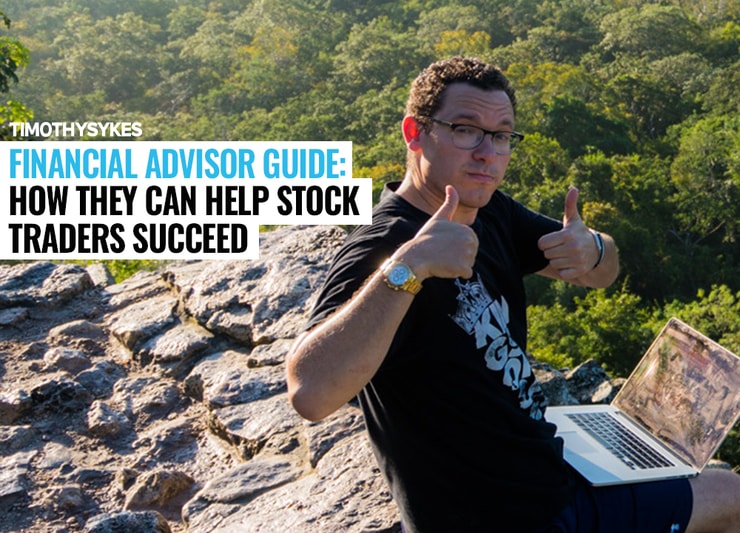What is a financial advisor? And why should you turn to one for help?
You’ve heard that old saying: “A lawyer who represents himself has a fool for a client.” The same goes for making financial decisions.
If you’re not educated in areas like investing and money management, you could make a serious mistake that costs you all you’ve saved. Turning to a financial advisor can help you make smarter choices with your money.
After all, you want your cash to work for you — not against you. Here is what I would tell someone if I were counseling him or her face-to-face.
Table of Contents
- 1 What is a Financial Advisor?
- 2 Personal Financial Advisor: Planner, Educator, Partner
- 3 How to Find the Right Financial Planner or Advisor
- 4 Situations in Which a Trader Requires a Financial Advisor’s Assistance
- 5 Key Questions To Ask a Professional Financial Advisor
- 6 How Do You Become a Financial Planner?
- 7 How to Prepare Yourself for The Stock Market
- 8 Why Should You Apply for the Trading Challenge?
- 9 The Bottom Line
What is a Financial Advisor?
If you don’t have a background in finance, your first question is likely, “What is a financial advisor?” A financial advisor is someone who has a degree in or extensive experience with money management and who counsels people about how to invest their money wisely.

Many financial advisors work for banks, credit unions, brokerage firms, and other private financial institutions. Others work for themselves. Either way, they provide advice and education, and some actually execute financial transactions on your behalf.
In many cases, people consult financial advisors when they have specific goals. For instance, if you want to save for your kids’ college funds or retire with a certain net worth, you might work with one of these professionals to reach that goal.
What Does a Financial Advisor Do For Clients?
What a financial advisor does depends heavily on his or her specific focus and expertise. Some, for instance, offer everything from savings advice to estate planning, while others focus more specifically on areas of finance like stock market investing or tax planning.
Don’t pick a name out of the phone book if you’re thinking about hiring a financial advisor. Instead, research professionals who work in your area and whose experience and clientele match your goals and financial position.
In other words, protect yourself. There are plenty of people out there who will take advantage of you — so-called “debt fixers,” cough, cough — so you need to know the person with whom you’re working.
- Get references from past clients.
- Read online reviews if they’re available.
- Investigate past employers.
- Ask for proof of any certifications, degrees, or licenses.
Personal Financial Advisor: Planner, Educator, Partner
In many ways, financial advisors are like therapists. Instead of helping you with psychological and emotional issues, they guide you through financial decisions.

Your financial planner or advisor should have your best interests in mind when making recommendations. If he or she receives money from a third party for making suggestions, run in the other direction.
A true financial planner partners with you to make sure you’re educated about your financial choices and operating within your risk tolerance.
Single-Issue Advice
You might decide to visit a financial advisor about a specific question or issue you’re facing. For instance, if you’ve just inherited a large sum of money, get help with managing it so you don’t squander opportunities or blow the whole sum on frivolous purchases.
Even with single-issue advice, you might meet with a financial professional multiple times. He or she can help you create and execute a plan, then check in with you every so often to make sure you’re heading in the right direction.
You might even turn a single visit into a long-term relationship if you like your advisor and appreciate his or her wisdom.
Comprehensive Financial Advice
Financial planners and advisors often work with clients during specific stages of life:
- Graduating from college and entering the workforce for the first time
- Starting a family
- Nearing retirement
- Preparing for bequests and other estate planning issues
In these cases, comprehensive financial advice can include where to invest money, how to create a specific type of investment account, the best options based on tax implications, and more. Many financial professionals even help you decide what types of insurance to buy.
Ongoing Monitoring of Your Financial Life
The third situation in which you might hire a financial professional is for help managing your financial portfolio on a long-term basis. This person becomes your long-term partner in managing your investments, savings, retirement accounts, and insurance policies.
You don’t need great wealth to engage a financial professional, but most people who hire advisors on a long-term basis have considerable assets. They might also need help managing debts, real property investments, and business matters.
For instance, real estate is a common investment these days. It’s not one I’m comfortable with because of the complexities involved, but lots of people have success with it.
You might need help with deciding how much to charge for rent if you’re a landlord. Or you could use a financial advisor to help you evaluate potential properties for flipping.
Do I Need a Financial Advisor to Invest?
You don’t need a financial advisor to invest. I started pennystocking back in school, and I’m completely self-taught. That doesn’t mean I haven’t read books or watched speeches by skilled investors, but I make my own trades.
There’s nothing wrong with seeking help from an advisor, but it’s not necessary if you’re willing to put in the hard work to learn the stock market. Once you’re proficient on your own, you can keep your profits rather than paying someone else to make decisions on your behalf.
You also have to realize that most financial advisors aren’t stock brokers. In other words, their expertise doesn’t lie in executing trades. I’ll talk more about certified financial advisors in a minute, but don’t confuse finance professionals.
How to Find the Right Financial Planner or Advisor
If you need a financial planner or advisor, you’ll want to find someone local. That way, you can meet face-to-face and get to know one another.
When I said earlier than a financial planner is your partner, I meant it. You need to feel comfortable with anyone who has access to your finances.
Services You Want
Ideally, your financial planner or advisor will have experience in every area of finance with which you need help. Otherwise, you’ll have to split your focus and work with more than one professional. That will cost you more.
The best financial advisors have experience with both macro and micro financial decisions.
At the macro level, the advisor helps you make decisions about investment accounts, insurance, savings plans, property investments, estate planning, and more. Their job is to make sure you have the best possible financial outlook for the future.
On the micro level, however, they should also be able to assist you with cash flow in your home. For instance, they might advise you on how much money to keep in regular checking and savings accounts, how much to set aside for charitable gifts, how best to pay your bills, and so forth.
Make a list of the services with which you want help. You’ll be able to narrow down the professionals in your area based on the services they provide.
Cost of These Services
Financial advisors typically have two payment models:
- One-time financial planning: This is a session or series of sessions during which your advisor helps you create a comprehensive financial plan. The cost can start at $1,000, but many advisors charge $3,000 or more.
- Ongoing financial advising: You’ll likely pay a monthly retainer for this type of service. For instance, your advisor might charge $200 per month to help you with ongoing financial decisions.
Know your budget before you meet with financial planners. You can weed out anyone who charges too much, but beware bargain-basement prices. Remember, you get what you pay for.
Qualifications and Standards
There are three main qualifications for financial professionals who provide advice and financial planning:
- Certified Financial Planner: A CFP completes about 1,000 hours of education through coursework and testing. The final exam takes about six hours. These professionals also have to have at least three years of experience in the field.
- Chartered Financial Analyst: These professionals are experts in investment portfolio management. They’re certified by the CFA Institute.
- Personal Financial Specialist: This professional is a certified public accountant, but must also meet other criteria to receive the designation. He or she has extensive experience in tax planning and preparation as well as estate planning.
Other credentials exist, but don’t assume that an abbreviation qualifies someone to handle your finances. Investigate the certification before you lend it any value in your decision.
What Is a Certified Financial Advisor?
When most people talk about certified financial advisors, they’re actually talking about certified financial planners. I mentioned them briefly in the section above.
A CFP is credentialed by the Certified Financial Planner Board of Standards, Inc. He or she has a wide range of knowledge and experience, so if you’re looking for comprehensive financial advice at a reasonable price, the CFP might be the way to go.
Is a Financial Advisor Worth It?
I can’t tell you whether or not to hire a financial advisor. It’s the right choice for many people because they want to know someone else has reviewed their decisions and provided advice for the future.
Others don’t want someone else to make or influence their decisions. They’d rather learn the ropes themselves and apply their knowledge to their own portfolios. There’s nothing wrong with that, either, as long as you’re not consistently making bad choices with your money.
Situations in Which a Trader Requires a Financial Advisor’s Assistance
While I don’t recommend following anyone’s financial advice blindly — I’m a self-taught trader, after all — there are situations in which you might want to consider hiring a financial advisor.
The thing is, money gets more difficult to handle as it grows. If you only have $500 in the bank, you don’t need anyone to tell you what to do with it. You pay your bills and save as much as you can.
But when greater sums come into play, you might need someone to help you manage it.
When You Receive a Large Sum of Cash
Have you read the stories about lottery winners who take home millions in cash and wind up broke a year later?
Don’t think it doesn’t happen. It’s more common than you might think.
When you receive a huge sum of cash, you’ll likely want to spend at least some of it. And while you’re buying that $3 million mansion on the West Coast, why not throw in a yacht and a jet while you’re at it?
Before you do anything with that large sum of cash, consult a pro. This is especially true if you’re jumping huge tax brackets in the process. If you’re not used to managing a large amount of money, you need someone who can watch your back and keep your feet on the ground.
When You Are Worth a Quarter Million
You heard it first here: $250,000 is a lot of money. However, it’s not enough.
You’re starting to amass serious wealth, but you don’t want to squander it. More importantly, you want it to grow.
For context, the latest data shows that Americans spend between $900K and $1.8 million in their lifetimes. That’s a lot more than $250K.
Since that data comes from 2009, we can assume that the average person actually spends more than that in 2018.
When you reach the quarter-million mark, you might want to meet with a professional, either as a one-off or on an ongoing basis, to make sure you’re making sound decisions.
When You Are Preparing To Pass on Your Wealth
Estate planning is serious business. You want your loved ones to reap as much benefit as possible from your wealth.
You’ll need an estate planner to help you set up trusts for your loved ones and accomplish other goals. It can be a long, strenuous process, but your children and other relatives will thank you when they don’t have to spend years in probate court.
Key Questions To Ask a Professional Financial Advisor
Before you hire a professional financial advisor, make a list of questions to ask him or her. Listen carefully to the answers. If something sounds off, trust your gut.
What’s His/Her Investment Philosophy?
You want your financial advisor’s investment philosophy to match yours as closely as possible. This is especially true when it comes to risk tolerance.
How comfortable is the advisor with taking risks? Does he or she take an aggressive or passive approach to finances in general?
You’ll be able to tell whether you’re comfortable with the advisor by listening to him or her speak. Focus on words that either give you comfort or make your pulse race.
How Often Should I Expect To Hear From Him/Her?
Communication is essential when you’re working with someone else who has a hand in managing your finances. You don’t want to hire someone who won’t contact you about important issues.
If you’re paying a monthly retainer, you should expect to hear from your advisor regularly. And if you call him or her, expect a pretty quick turnaround on a return call.
What Does He/She Believe Works in Both Good and Bad Markets?
Next, you want to find out how the advisor responds to shifts in the market. How does he or she adjust financial decisions based on the ebb and flow of the stock market, economy, and other influential factors?
How Do You Become a Financial Planner?
If you’re interested in financial planning as a career, you’ll need a bachelor’s degree as well as at least three years of experience in finance. You might work for a bank or credit union, for instance, in the personal banking sector.
I also recommend learning as much as you can about finance on your own time. Watch the stock market, learn about different types of investments, study estate planning, and beef up your interpersonal skills. You’ll work one-on-one with your clients, so you have to learn how to communicate effectively with them.
However, becoming a financial planner isn’t the only way to get involved in the finance field. You might prefer to invest in the stock market instead. It’s an exciting, rewarding career or side hustle choice because you get to make decisions based on meticulous research and planning. It all comes down to how well you can read the market.
How to Prepare Yourself for The Stock Market

If you’re interested in investing in the stock market, I recommend an intense period of study. Learn all you can about the jargon as well as charts, financial statements, stock movements, types of investments, and more.
Learn the difference between short and long positions, what penny stocks are, and whether you should invest in blue-chip stocks. The more you know about how the stock market works, the safer your money will become when you execute that first trade.
You’ll also have to decide how much money you want to put in your investment account and which broker you want to use. I started my trading career with just over $12,000. Some people start with more, while others begin with considerably less.
My blog offers tons of free information about getting to know the stock market. You can also check out my YouTube channel for informative videos.
You can check out my trading plans, each of which comes with trade alerts and other advantages. I’m a teacher at heart. Now that I’ve found success in the stock market, I want to pass on my knowledge to others.
Finally, realize that you have to be conservative when trading any type of stock. I specialize in penny stocks, which are speculative investments that trade at $5 per share or less. I like penny stocks because they’re extremely egalitarian in terms of the barrier to entry. You don’t have to have a ton of money to get started, and you don’t have to risk a large portion of your account to make money.
In fact, you shouldn’t. I never use more than 20 percent of my account on a single play. That’s how I conserve my wealth.
Why Should You Apply for the Trading Challenge?
If you’re reading this article, I assume you’re serious about making money. Maybe you’re interested in generating five or six figures a year so you can enjoy the laptop lifestyle for the rest of your days. Or perhaps you’re committed to generating at least $1 million in profits from the stock market.
My students come from all walks of life, and each has individual goals. Everyone is working for something, though, and I teach my students to visualize their ideal lifestyle while they’re learning from me and other successful traders.
Furthermore, the challenge offers a community of like-minded people who help each other achieve their goals. It’s not just me in the trenches. When you know there are other people striving for the same things you want, you’ll have greater motivation to work hard.
If you want to create a different life for yourself, I invite you to apply for my Trading Challenge. I’m looking for my next success story, and you might become that person if you’re willing to put in the effort and become a successful trader.
The Bottom Line
I’m not a financial advisor, but I’ve met many. They’re great at what they do, and many of them specialize in specific areas of finance.
There are times when people need help with their finances. There’s nothing wrong with that, especially if you’re building significant wealth. Nobody wants to wind up squandering their cash or making poor investment choices.
That’s where a financial planner comes in. He or she reviews your financial situation and makes recommendations based on his or her experience.
If you decide to hire an advisor, I wish you the best of luck. Just make sure to do your research and choose someone who can give you sound advice.
I also encourage you to apply for my Trading Challenge. It’s a way for you to learn pennystocking and other trading strategies from me as well as from my most successful students. I can’t wait to help you become my next success story.



Leave a reply